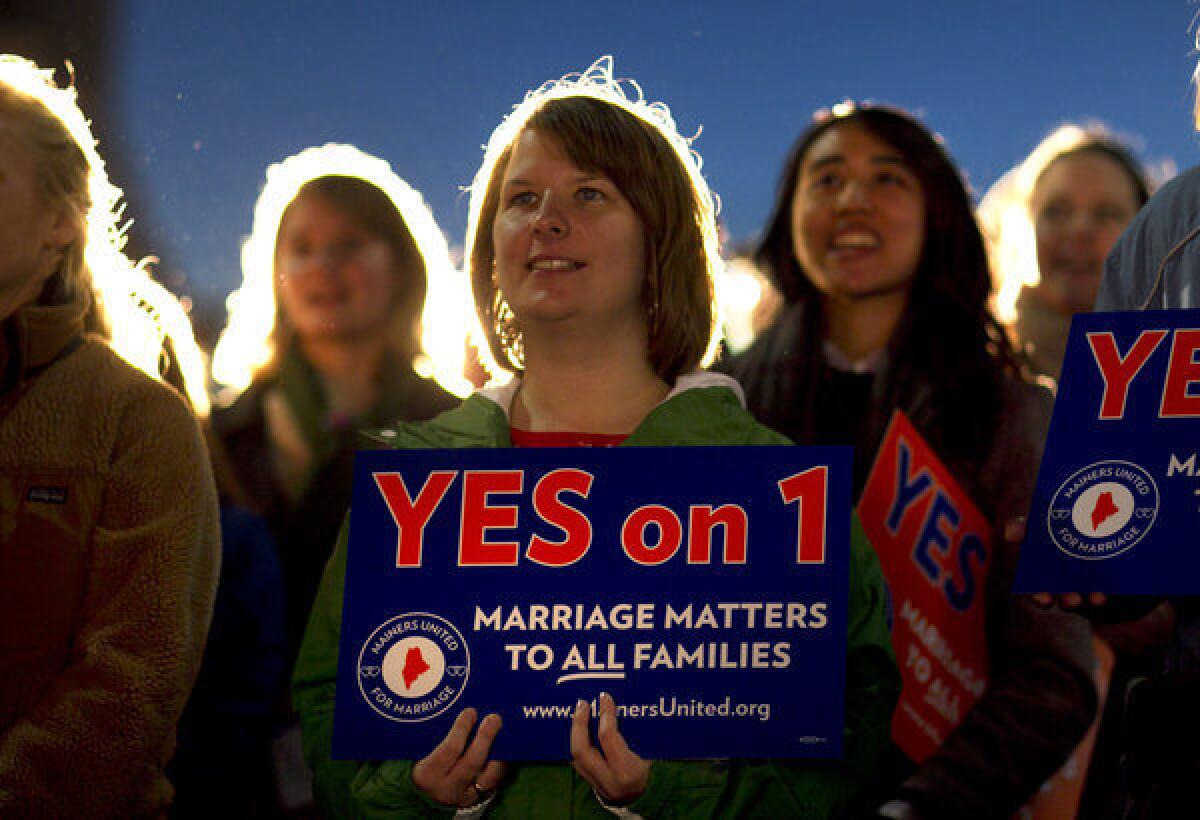Voters OK gay marriage in Maine, Maryland

- Share via
CLEVELAND — Maine and Maryland became the first states to back same-sex marriage at the ballot box Tuesday night, buoying gay rights advocates and breaking a years-long losing streak.
The controversial issue had been before voters 32 times and had been rejected every time. But activists said public opinion had shifted since 2008, when California passed a constitutional amendment reserving marriage for heterosexual couples. A 2010 poll showed that, for the first time, more Americans supported gay marriage than opposed it, and in May, President Obama endorsed same-sex marriage.
“When the history books are written, 2012 will be remembered as the year when LGBT Americans won decisively at the ballot box,” Chad Griffin, president of the Human Rights Campaign, said in a statement. “The dreams of millions of fair-minded Americans were realized as discrimination crumbled and equality prevailed.”
Advocates were also awaiting results of gay marriage initiatives in Minnesota and Washington.
Those who believe marriage should be between one man and one woman dispute that Tuesday’s election changes anything.
“These are really specific states,” said Frank Schubert, a California consultant who ran the traditional-marriage campaigns in the four states. “The fact that an uber-liberal state like Maine or Washington might go for same sex marriage, it doesn’t mean that the country has changed.”
Maine’s initiative, Question 1, had asked voters to allow officials to issue marriage licenses to same-sex couples. Just three years ago, the state defeated a same-sex marriage bill at the ballot box. But a lengthy campaign to change voters’ minds persuaded some Mainers, said David Farmer, spokesman for Mainers United for Marriage.
“We’ve had more than 250,000 one-on-one conversations with people; we are confident that those personal connections have worked to move folks,” he said earlier. With 64% of precincts reporting late Tuesday, Question 1 held an eight-point lead and the Associated Press projected its passage.
Maryland and Washington had been considered toss-ups. In both states, the Legislature passed and a Democratic governor signed a bill allowing same-sex marriage. And in both states, opponents collected enough signatures for a referendum on the law, putting it on hold in the meantime.
When Maryland upheld the law, 52% to 48%, it became the first state below the Mason-Dixon line to legalize gay marriage.
“Fairness and equality under the law won tonight,” said Josh Levin, campaign manager for Marylanders for Marriage Equality. “We’re sure to feel the ripples of this monumental victory across the country for years to come.”
Washington state’s website listed that state’s referendum with a lead, but complete results will not be available until at least Wednesday. That’s because the vast majority of voters do so by mail, and have until election day to mail their ballots.
In Minnesota, if voters side with gay-rights advocates, same-sex marriage will remain illegal because of existing law. The current measure seeks to put a same-sex marriage ban into the state’s constitution. With half of precincts reporting, the race was nearly even.
Before Tuesday night, gay marriage was legal in the District of Columbia and six states — Vermont, Connecticut, Iowa, Massachusetts, New Hampshire and New York. But 30 states have constitutional amendments prohibiting it, and 11 more — including Minnesota — have laws banning it.
For some voters, this election seemed eerily similar to 2008, when Obama was running for president and an anti-gay marriage initiative was on the California ballot. Obama won, but so did Proposition 8, which overruled a state Supreme Court decision and added an amendment to the state constitution defining marriage as between one man and one woman. In 2010, a federal judge rejected Proposition 8, but his ruling is on hold pending appeal.
Los Angeles TV writer Jen Braeden, 32, remembered the disappointment of 2008 and, earlier Tuesday, was wary about the referendum in her home state of Maryland. Braeden, who lives with her girlfriend of three years in Mount Washington, said she would like to wed if same-sex marriage becomes legal in Maryland, but wasn’t ready to get her hopes up.
“I definitely think things are changing. In 30 years, this will be a non-issue, like interracial marriage,” she said. “But national opinion is changing slowly, and as of right now, I don’t know if we’re there yet.”
Now, the battle moves to other states. Lawmakers are prepared to introduce bills protecting same-sex marriage in the legislatures of Illinois, Delaware, Rhode Island and Hawaii.
“People on both sides feel strongly about what marriage is,” said Schubert, the campaign consultant. “From our perspective, it doesn’t matter what a state decides to call a relationship. We’ll continue to have this argument regardless.”
More to Read
Sign up for Essential California
The most important California stories and recommendations in your inbox every morning.
You may occasionally receive promotional content from the Los Angeles Times.














